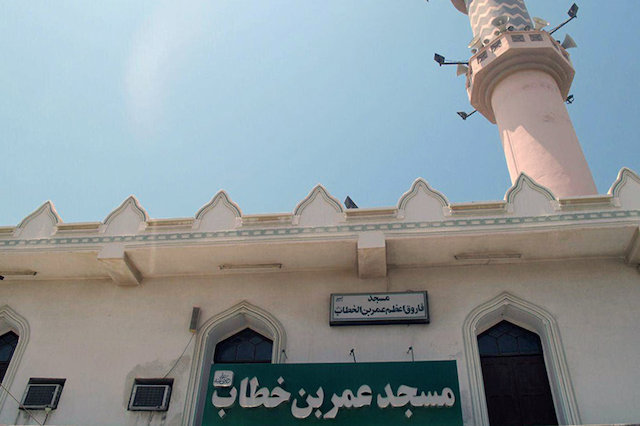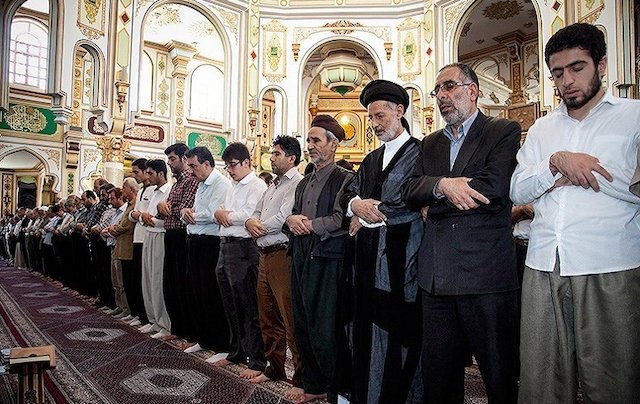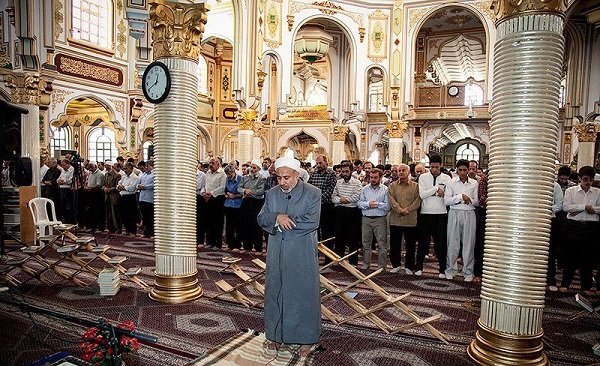by Anastasia (Fatima) Ezhova*
As the Muslim world celebrates the great holiday of the Holy Prophet’s (s) birthday and while the victory over ISIS has been officially announced, the issue of Islamic unity becomes especially topical. Unfortunately, we have to state that there are many ways and methods to spoil the joy of victory, and spreading Takfiri destructive ideology is just one of them.
One of the controversial topics, that constantly serves as an object of the enemy’s numerous insinuations, is the issue of Sunni mosques in Iran. Various so-called human rights activists and organizations as well as Wahhabi preachers emphasize that, in their opinion, Sunni Muslims are oppressed in Iran, because as they claim the Islamic Republic does not allow construction of Sunni mosques. Unfortunately, many Sunni Muslims from all over the world are misguided by this propaganda; thus, thinking that Sunnis of Iran are really persecuted; this is while, to the contrary, their rights and status are guaranteed by the Iranian Constitution as well as by the principles of the Shia school of Islamic law.
It seems that even primary statistics refutes these accusations: there are at least 9 Sunni mosques[1] in Tehran and more than 15,000 Sunni mosques all over the Islamic Republic; note that among Iranian Muslims 90-95 % of them are Shias and 10-15 % are Sunnis. Everyone who has visited Iran can confirm that in provinces where Sunni branch of Islam is widely spread it may be harder to find a Shia mosque than a Sunni one. For example, while having rested on Kish island, I would take a taxi when I wished to go to a mosque for Salah al-Eid or Jum‘ah. Taxi drivers usually asked me which mosque I needed to go, a Shia or a Sunni one, as Hormozgan province — where Kish Island is located — is highly populated by Sunnis.
The fundamental nature of the issue of Sunnis vs. Shia mosques is another one: is it correct in itself to consider a difference between a Sunni mosque and a Shia mosque? What is the essence and the purpose of a mosque? When does its confessional identity play an important role? Why do Muslims need mosques and when do they attend it?
If we describe the objectives of a mosque then we can comprehend why all these discussions, about Sunni or Shia mosques, are predominantly senseless.
First of all, a mosque is a special, sacred place for prayer and worshipping the Almighty Allah. Meanwhile, the difference between a mosque and a Hussayniyeh, or a prayer room (musalla, namaz-khaneh), is that a special formula (so-called “sigheh masjid”) is read over this sacred Home of Allah; and it has some judicial (fiqhi) aftermath.
Any Muslim, whatever nation, country, denomination, age or gender, he or she belongs to, has a basic right to attend a mosque and to offer obligatory (wajib) or recommended (mustahabb) prayers, unless he or she is not in the state of absence from major ablution (ghusl). In fact, a mosque should always be open for every believer, though, due to different reasons in many countries mosques open only at a time of performing collective prayers. If a Muslim is unlawfully deprived from entering a mosque, it’s regarded as an example of great oppression towards him or her.
The second purpose of a mosque is to serve as a place where all the collective (jama‘at), Friday (Jum‘ah), and holiday (Eid) prayers can regularly take place. Although, in theory, any practice and just (‘adil) Muslim whose Arabic pronunciation is good can lead a prayer, in practice there is usually an Imam of a mosque who is permanently employed there.
The third role that a mosque plays is that it’s a place of communication where Muslims gather, interact, study (attending lessons of Qur’an, fiqh, etc.) and discuss important social and political items related to our Ummah. Islam is not a religion of pure worship separated from politics and other “worldly” affairs, vice versa, it is directly linked to the political sphere, international relations, ruling a state, etc. That’s why, if an Imam of a mosque understands this core essence of Islam, he always tackles the current political agenda in its relation to the destiny of the Ummah in his sermons.
So, we have figured out that a mosque pursues three main objectives. Then, is it important whether it is Sunni or Shia while carrying out these missions?
If we take the first mission into account, we’ll see that there is absolutely no difference between a Shia mosque and a Sunni mosque. Basically, nothing prevents a Sunni from coming to a Shia mosque and to pray there, according to the rules of his or her denomination, as well as a Shia can visit a Sunni mosque and pray, his or her own way there, though, in practice, this person may face problems in such countries and regions where Takfiri attitudes have spread. But it’s not the case in Iran: Iranian people are very friendly, polite, and tolerant towards different creeds, whether Muslim or non-Muslim.

Moreover, in Iran there are perfect conditions for performing prayers on time whenever you are. In addition to countless mosques, small prayer rooms are always open, and you can find them everywhere: at airports, at schools, at universities, at offices, at hotels, at trading centers, at beaches, at sport centers, at parks – at just about any place you visit. And, if you want to pray, whether you are Shia or Sunni, there is no law, no prohibition to deprive you of your right to pray at any mosque. Problems with offering prayers don’t exist in Iran at all. And anyone is free to perform them according to the rules of any denomination.
Now, let us ponder over the third purpose: will a Sunni, brother or sister, face any kind of aggression while coming to a Shia mosque in Iran? My first hand experience, while studying in Iran and attending conferences, definitely proved otherwise: Sunni Muslims from various countries used to pray shoulder to shoulder with us, and no one uttered a single word against them. Together we attended sessions, lectures, mausoleums and mosques, no Iranian Shia tended to perform any kind of discriminative act against my Sunni companions. Thus, if a Sunni comes to an Iranian Shia mosque, he or she will be welcomed and warmly accepted, if this person is polite and is not inclined to act based on Takfiri viewpoints or spread them. Of course, there are numerous topics for dialogue; common grounds uniting Muslims of all denominations and from all over the world, be it East or West. This includes confronting Zionism and US arrogance, supporting oppressed people and nations, preserving Islamic sanctities (of which Al-Aqsa has been the most crucial on recent days), helping the poor and orphans, defending hijab, opposing Islamophobia, protecting Islamic family values and the list goes on.

The only denominational differences where the identity of a mosque might become a matter of concern is related to the second purpose, I have introduced it above as being a place where congregational prayers are offered. Yes, there are a few differences between Sunni and Shia methods of performing prayers, and, surely, the Imam of the mosque will offer it according to his own religious denomination. Even though, nowadays, Sunnis and Shias often perform collective prayers together, there are Muslims who prefer to attend congregational and Friday prayers offered strictly in accordance with their own school of Islamic law. This usually depends on which particular denomination is predominant in that exact region. If native Sunnis are few, then it is simply not common to open a special Sunni mosque, and the minority community does not show interest in building their own mosque. The same applies for the Shia community. It’s not a matter of an attitude towards non-Shia Muslims, it is a matter of finances or community preferences.

The Iranian Constitution guarantees the rights of the followers of any denomination to observe their rituals:
“Article 12
The official religion of Iran is Islam and the Twelver Ja'fari school [in usual al-Din and fiqh], and this principle will remain eternally immutable. Other Islamic schools, including the Hanafi, Shafi'i, Maliki, Hanbali, and Zaydi, are to be accorded full respect, and their followers are free to act in accordance with their own jurisprudence in performing their religious rites. These schools enjoy official status in matters pertaining to religious education, affairs of personal status (marriage, divorce, inheritance, and wills) and related litigation in courts of law. In regions of the country where Muslims following any one of these schools of fiqh constitute the majority, local regulations, within the bounds of the jurisdiction of local councils, are to be in accordance with the respective school of fiqh, without infringing upon the rights of the followers of other schools.
Article 13
Zoroastrian, Jewish, and Christian Iranians are the only recognized religious minorities, who, within the limits of the law, are free to perform their religious rites and ceremonies, and to act according to their own canon in matters of personal affairs and religious education.
Article 14
In accordance with the sacred verse; "God does not forbid you to deal kindly and justly with those who have not fought against you because of your religion and who have not expelled you from your homes" [60:8], the government of the Islamic Republic of Iran and all Muslims are duty-bound to treat non-Muslims in conformity with ethical norms and the principles of Islamic justice and equity, and to respect their human rights. This principle applies to all who refrain from engaging in conspiracy or activity against Islam and the Islamic Republic of Iran”[2].
Note that these principles were not invented by the late Imam Khomeini (ra) as new laws, rather, being among the greatest scholars of Shia Islam, his Eminence derived them from Shia sacral sources and the traditions of the Infallibles (as). As for mosques, in essence, there are no Shia and Sunni mosques in Islam, only one type of mosque does really exist – it’s an Islamic mosque, the Dome of Allah, the sanctuary for all pious and true Muslims.
[1] https://en.mehrnews.com/news/109045/Sunnis-running-9-mosques-in-Tehran
[2] http://www.iranonline.com/iran/iran-info/Government/constitution-1.html

*Anastasia (Fatima) Ezhova is a Russian political analyst, writer and journalist. She was born in 1983. After a long journey, Ms. Ezhova converted to Islam in 1999. She graduated from Moscow State University (faculty of philosophy) in 2005. Ezhova is also the editor-in-chief of "The Axis of Resistance" website (www.mihwar.ru) and a member of an editorial board of "Musulmanka" Islamic female magazine.
The views, opinions and positions expressed on Op-Ed are those of the author(s) and do not necessarily reflect the views, opinions or positions of Khamenei.ir.







Comments